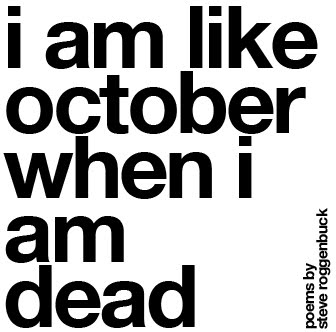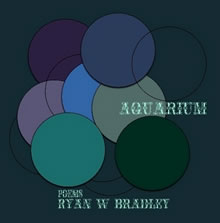“ultimately beautiful”: an Interview with Steve Roggenbuck

I saw Steve Roggenbuck read at Stephen Dierks house during AWP week he stood on top of something, I can’t remember what, he is small, his physical presence not very dominating. But he stood up there and took control of the audience, yelling 666 and Justin Bieber and all kinds of weird shit. The audience stood there, completely enthralled. People were yelling and screaming during the whole reading, people were extremely excited to be at a poetry reading.
According to AD Jameson Steve Roggenbuck would be considered a New Sincerist and the question has been asked, if writing in such a sincere manner can be prolonged over a long career. I think it can, because sincerity is transitory. The writing is Buddhist in that way, an acceptance of endless change, the impermanence. We can be convinced of truth at times/later/that truth becomes false/we forget those beliefs. For three years we read one type of books/then move onto another/then move onto another. We move from the country/to the city/we fall in love/we fall out of love/do it again/we don’t have sex for two years/we meet a sado maschocist and get choked/we have kids/watch them grow/we wash diarrhea off her our naked father because he is sick and dying/we become concerned about insurances/it goes/on on on. Roggenbuck’s first book I am like October when I’m Dead were short little poems with a tibit of sentimentality. Helvetica was this blitzkrieg of weird ass flarf lines. And Crunk Juice was an intensely designed chapbook with longer poems, using more poetic devices with a higher emphasis on sound. These changes, are not just the changes of a writer, but Steve Roggenbuck changing before us, we are getting older with him. He asks us to join him, on his journey through life, seems a little like reality television, but who wouldn’t want a reality television full of really emotional well-read people.
NC: I think what you don’t do is one of the reasons you have made such a ‘big splash.’ Like you didn’t go down the depression road when writing, which I think invited a lot more people into the alt-lit scene. Because not everyone is suffering from depression and existential crisis all the time. Did you consciously reject the depression route or just find it not your style? READ MORE >
Theory of Prose & better writing (ctd): The New Sincerity, Tao Lin, & “differential perceptions”
In the first post in this series, I outlined Viktor Shklovsky’s fundamental concepts of device (priem) and defamiliarization (ostranenie) as presented in the first chapter of Theory of Prose, “Art as Device.” This time around, I’d like to look at the start of Chapter 2 and try applying it to contemporary writing (specifically to the New Sincerity). As before, I’m proposing that one can actually use the principles of Russian Formalism to become a better writer and a better critic.
Watch the ALT LIT GOSSIP 2011 Awards Broadcast
ALT LIT GOSSIP ran a live awards broadcast hosted by Steve Roggenbuck. Below you can watch the archive footage.
I’m Not Going To Make It Through This Life. Okay, Never Mind. Do You Like Ice Cream? : 3 Reviews
i am like october when i am dead poems by steve roggenbuck
18pp published by Steve Roggenbuck (2011)
 Steve Roggenbuck is not Robert Frost. His poems avoid forests of metaphors. Although they might give you a woody. Roggenbuck’s poems are not pedestrian, but peripatetic. They get you to think, just a little bit, about murder and loss. They also make you look into a night sky and wonder what you had for lunch or what’s on TV. Roggenbuck’s poems hold up dead flowers, then make you leave the room after declaring that that’s all there is. They are rakish, shake a giant rake to scare you, gather dead leaves outside the church of poetry, walk an elephant into that strange part of you called consciousness. Steve Roggenbuck’s poems will choke your dad for your birthday. They don’t care. They will not answer your calls. They are alive with the memories of killers, wonder what they will harvest, then stuff dogs into garbage trucks. These poems are the eraser of two hundred years of American poetry, the shout at the end of a sentence that seeks always a little bit of anarchy, a car on fire. Roggenbuck’s poems are the beginning of a great career.
Steve Roggenbuck is not Robert Frost. His poems avoid forests of metaphors. Although they might give you a woody. Roggenbuck’s poems are not pedestrian, but peripatetic. They get you to think, just a little bit, about murder and loss. They also make you look into a night sky and wonder what you had for lunch or what’s on TV. Roggenbuck’s poems hold up dead flowers, then make you leave the room after declaring that that’s all there is. They are rakish, shake a giant rake to scare you, gather dead leaves outside the church of poetry, walk an elephant into that strange part of you called consciousness. Steve Roggenbuck’s poems will choke your dad for your birthday. They don’t care. They will not answer your calls. They are alive with the memories of killers, wonder what they will harvest, then stuff dogs into garbage trucks. These poems are the eraser of two hundred years of American poetry, the shout at the end of a sentence that seeks always a little bit of anarchy, a car on fire. Roggenbuck’s poems are the beginning of a great career.
* * *
The Day Was Warm and Blue poems by Richard Loranger
28pp published by Richard Loranger (2002)
 Richard Loranger is gay. He remembers the colors, temperatures of his mornings. Some of these simple memories become poems. Like the twenty-eight poems contained in this book. However, Loranger’s poems are not really contained. Or, if they are, they are contained the same way a sky is contained: warm and blue. But, peculiar. Very, very peculiar. Each poem is a tiny ass-fuck on the same day you kill your boss. Each one is there, with you, because there is nothing else to do. This makes them wonderful. Loranger’s poems are pretty butterflies. They flutter through a room and are closely listened to, but only after they have been eaten. They gather dead leaves outside the church of poetry, put them on a shelf, forget them, maybe. If Loranger had the time he would write these poems upon a wall using his own urine. They are that simple and that marvelous. And who knows? Perhaps he already has. Each of these poems are a little song that drifts by. They are the shadow of an acrobat tumbling in air, a cat in each eye. They are a drink of water after an argument, the mystery of television. Doused in gasoline, simple, lyrical, they want to know who’s in charge, will only listen to the secrets of plants, then wait quietly, to get the names they need to celebrate their small fire. Time has nothing to do with them. I mean, who needs time? These poems keep going on and on, each in their little, magnificent way, all warm and blue.
Richard Loranger is gay. He remembers the colors, temperatures of his mornings. Some of these simple memories become poems. Like the twenty-eight poems contained in this book. However, Loranger’s poems are not really contained. Or, if they are, they are contained the same way a sky is contained: warm and blue. But, peculiar. Very, very peculiar. Each poem is a tiny ass-fuck on the same day you kill your boss. Each one is there, with you, because there is nothing else to do. This makes them wonderful. Loranger’s poems are pretty butterflies. They flutter through a room and are closely listened to, but only after they have been eaten. They gather dead leaves outside the church of poetry, put them on a shelf, forget them, maybe. If Loranger had the time he would write these poems upon a wall using his own urine. They are that simple and that marvelous. And who knows? Perhaps he already has. Each of these poems are a little song that drifts by. They are the shadow of an acrobat tumbling in air, a cat in each eye. They are a drink of water after an argument, the mystery of television. Doused in gasoline, simple, lyrical, they want to know who’s in charge, will only listen to the secrets of plants, then wait quietly, to get the names they need to celebrate their small fire. Time has nothing to do with them. I mean, who needs time? These poems keep going on and on, each in their little, magnificent way, all warm and blue.
* * *
Aquarium poems by Ryan W Bradley
26pp published by Thunderclap Press (2010)
 Ryan Bradley is straight. He eats lots of spaghetti. He sees pornography everywhere. His poems are a testament to that vision: defiant, sexy, sometimes late for class. It is a teenager’s world. Bombs go off like songs on the radio. And Bradley listens, makes them pretty, finds the wonder in flashing red lights, women falling from the sky, a city on fire. Bradley’s poems attempt to feel things. That is, they are thinking: About the next cigarette, cheerleaders buried under ice, a sudden sensation that slants everything, makes you walk funny. It likes girls, smoke, the Beatles. But best of all, they get depressed in the summer, still believe in the alcoholism of the blues, disguise their social class because these were born poor. Sex and death. It’s all here in these poems. And if you aren’t drunk by page two, you will be by page twenty-six. Drunk and slightly bruised. And touched, lightly. Because Bradley’s hand is light, might even take you far away. Imagine particles, the flash of fireflies, the nakedness of desire—cells rapidly dividing—spread over noodles. These poems are peppered with neighbors singing opera, but Bradley also wants to hear your eyelids closing. He’s sweet. These poems are sweet. All of them, underwater.
Ryan Bradley is straight. He eats lots of spaghetti. He sees pornography everywhere. His poems are a testament to that vision: defiant, sexy, sometimes late for class. It is a teenager’s world. Bombs go off like songs on the radio. And Bradley listens, makes them pretty, finds the wonder in flashing red lights, women falling from the sky, a city on fire. Bradley’s poems attempt to feel things. That is, they are thinking: About the next cigarette, cheerleaders buried under ice, a sudden sensation that slants everything, makes you walk funny. It likes girls, smoke, the Beatles. But best of all, they get depressed in the summer, still believe in the alcoholism of the blues, disguise their social class because these were born poor. Sex and death. It’s all here in these poems. And if you aren’t drunk by page two, you will be by page twenty-six. Drunk and slightly bruised. And touched, lightly. Because Bradley’s hand is light, might even take you far away. Imagine particles, the flash of fireflies, the nakedness of desire—cells rapidly dividing—spread over noodles. These poems are peppered with neighbors singing opera, but Bradley also wants to hear your eyelids closing. He’s sweet. These poems are sweet. All of them, underwater.
– – –
Janey Smith (b. March 30, 1981, Anaheim, California) was born on the same day that President Ronald Reagan was almost assassinated. She likes to think her birth had something to do with it. Janey lives in San Francisco, CA.
June 23rd, 2011 / 2:03 pm
The Poetry of Steve Roggenbuck
Steve Roggenbuck is the author of two poetry collections, i am like october when i am dead and DOWNLOAD HELVETICA FOR FREE.COM. Both collections feature what could be called minimalist poetry, notably short poems of only a few lines, sometimes one phrase, and both were self-published into the public domain, both in print (for purchase) and online (for free).
Here is the title poem from the former:
i am like october when i am dead
there is my hand
i am like the killers of people
Here is another poem from that book:
to my nephew on his birthday
i will choke your dad
i dont care
im not afraid

